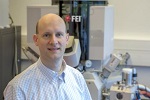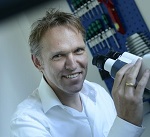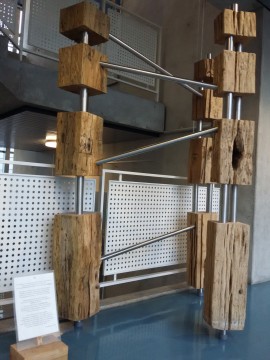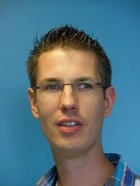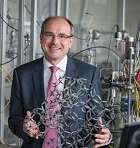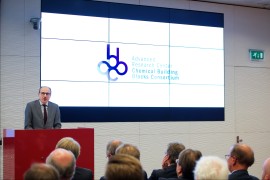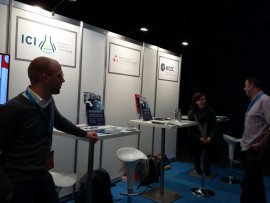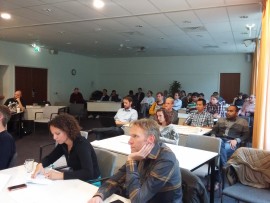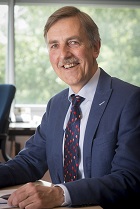Dr. Marijn van Huis has received an ERC Consolidator Grant of two million Euros for being the first to produce live atomic-level resolution images of how nanomaterials are formed in a solution. This is interesting for the development of new sustainable and smart materials, but also for issues such as understanding earthquakes. Read more>
News
Prof. Rob Lammertink received VICI grant
Prof. Rob Lammertink received a prestigious VICI grant by NWO on “Mixing at the boundary”.
This research focuses on the phenomena that occur in liquids on walls. Due to the specific properties of the wall, a liquid can be set in motion. This motion can subsequently be used to increase the transport of substances, which has enormous consequences for separation and catalytic processes. Vici is one of the largest grants for individual scientists in the Netherlands and is part of NWO’s Talent Scheme. Read more>
Eindhoven Labtour
The labtour on the 29th of January 2016 at Eindhoven University of Technology was a success.
Emile Hensen and Ivo Filot gave a short introduction on the work of the SMK group, while Hans Kuipers, Johan Padding and Frank Peter did the same on the work of the SMR group.
The MCEC projects @ TU/e where presented by the PhD students and Postdoc’s (Vishak Chandra, Paolo Lovreglio, Jiangtao Lu, Maxim Masterov, Aditya Sengar, Vetrivel Shanmugam, Teresa de Martino, Robin Bros, Roderigh Rohling, Jan Wiesfeld). The program was followed by a labtour giving insight in the current research as well in future experimental setups.
Niels Deen appointed as Professor of Multiphase & Reactive Flows
From January 2016 Niels Deen is leading the research group Multiphase & Reactive Flows at TU/e. As a result of the merger of the two groups (Combustion Technology and Process Technology), the new research group will encompass the entire range from fundamental research through design oriented research in the field of Multiphase and Reactive Flows. Typical applications of this research area are oil and gas extraction, automotive, food and chemical industry, and power plants. Read more>
Prof. Bert Weckhuysen appointed member of KVAB
Bert Weckhuysen has been invited to join the Royal Flemish Academy of Belgium for Science and the Arts (KVAB). He will formally be welcomed on 12 December at the Public Meeting as a ‘foreign member’ in the Class of Natural Sciences. “It is a great honour, but it is also a bit unreal as a Belgian to be admitted to a Belgian institute as a ‘foreign’ member”, Bert says.
ARC CBBC: National research center for chemical building blocks
7 December 2015 Minister Henk Kamp announced the kick off of ARC CBBC.
AkzoNobel, BASF, Shell, the Ministry of Economic Affairs, Top Sector Chemistry, the Netherlands Organisation for Scientific Research (NWO) and Utrecht University, the Eindhoven University of Technology and Groningen University presented their plans for setting up the new Advanced Research Center Chemical Building Blocks Consortium (ARC CBBC).
The ARC CBBC is a national research center that continues to build on expertise within the “Gravitation” programs. Bert Weckhuysen, one of the main initiators of this new consortium: “With this initiative we wants to connect the industrial and academic strengths available in the Netherlands to work on global societal challenges in a long term collaboration.” This national research center will tackle important energy and chemistry issues associated with the growing depletion of the finite supply of raw materials.
After the opening speech of Minister Henk Kamp, one of the main initiators Prof. Bert Weckhuysen introduced ARC CBBC in a nutshell and showed the introduction movie to give the audience an idea about the importance and uniqueness of this research center. Mr. Marjan Oudeman (President, Utrecht University) talked about the importance of the center from the perspective of the universities involved. Knut Schwalenberg (Managing Director AkzoNobel, The Netherlands) and Drs. Dick Benschop (President-director Shell, The Netherlands) closed the presentations by pointing out the importance of the long term collaboration from the companies’ point of view.
MCEC at CHAINS 2015
MCEC was represented at CHAINS2015 (30 November, 1&2 December) together with the other Dutch Gravitation programs in the field of chemical sciences:
- The Research Center for Functional Molecular Systems (FMS) aims to gain a deeper understanding of the molecular mechanisms, structures, and chemical processes that lead to living systems.
- The Institute for Chemical Immunology (ICI) brings together Chemistry and Immunology in the new field of Chemical Immunology to diagnose and treat diseases related to immune system failure via new, targeted chemical compounds.
The following MCEC members contributed to this event as keynote speaker, chair or speaker at several sessions: Albert van den Berg, Rosa Bulo, Emiel Hensen, Volker Hessel, Petra de Jongh, Evgeny Pidko
The following MCEC posters where presented:
Robin Broos (TU/e) “The effect of surface termination on direct CO dissociation over Hagg carbide”
Robin Geitenbeek (UU) “The effect of silica overgrowth on the temperature dependent luminescence of NaYF4:Yb3+/Er3+”
Teresa de Martino (TU/e) “Study of Novel Foam Cobalt based catalyst for Fischer-Tropsch reaction and reactor modeling”
Roderigh Rohling (TU/e) “Enzyme mimicking confinement-driven reactivity of zeolite catalysts in the Diels Alder Cycloaddition and dehydration reaction for biomass valorization”
Vetrivel Shanmugam (TU/e) “Novel route to immobilizing Ni nanoparticles into mesoporous silica with size, location control and sintering resistant reforming of poly alcohol”
Jan Wiesfeld (TU/e) “Synthesis of novel solid acid catalysts for biomass conversion”
Pieter Bruijnincx joins De Jonge Akademie
Pieter Bruijnincx has been asked to join The Young Academy (De Jonge Akademie), an independent KNAW platform of top young scientists with outspoken views about science and scholarship and the related policy. Pieter: “I am looking forward to contributing policy recommendations and to increase awareness of science in society.”
The Young Academy has 50 members of top scientists from all scientific disciplines, appointed for five-year terms. Within the Academy, the researchers focus on one or more themes: interdisciplinarity within science, science policy,
science and society and internationalisation.
MCEC School 2015
The first MCEC School was a great success thanks to all the participating PhD students, postdocs and staff members.
The five days program was composed of several lectures of different disciplines that are brought together in the MCEC Program. The lectures where provided by Hans Kuipers, Bert Weckhuysen, Rutger van Santen, Albert van den Berg, Marjolein Dijkstra, Alfons van Blaaderen, Detlef Lohse, Niels Deen, Pieter Bruijnincx, Monica Barroso, Krijn de Jong and Emiel Hensen. It was our pleasure to be able to invite guest lecturers Ruud van Ommen (Delft University of Technology) and Thomas Jaramillo (Stanford University).
During the week the participants were also able to learn each other better by several outdoor activities and the case studies that they presented on the last day with guidance of Rosa Bulo, Johan Padding and Rob Lammertink.
Prof. Krijn de Jong member of the Academia Europaea
14-10-2015
The Council of the Academy invited Krijn de Jong to become a member of the Academia Europaea. The election to become a member is an honor that recognizes his international scholarship.
The Academy of Europe was founded in 1988 and consists of eminent individual scholars form the continent of Europe. The members cover the full range of academic disciplines that comprises the humanities, social, physical and life sciences as well as mathematics, engineering and medicine; currently there are 3200 members.
This broad assembly of excellence and the pan-European distribution of the members make the Academia unique among other European Academies.
